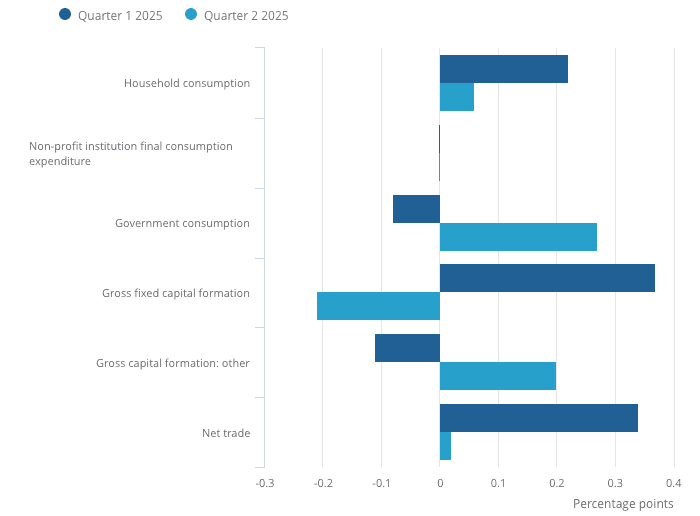- Data snapshot at update:
- GBP/USD @ 1.1628, up 0.25%
- GBP/USD @ 1.3582, up 0.05%

Image © Adobe Images
The data will firm the floorboards underneath the Pound.
The British Pound was given another shot of support after the ONS said the UK economy rebounded in June, while figures for the second quarter were firmer than expected.
The economy grew 0.4% month-on-month in June, snapping a run of negative prints (May was -0.1%) and beating expectations for a more subdued recovery of 0.1%.
GDP for the second quarter rose 0.3% q/q versus 0.1% expected, although this represents a cooling from the Q1 growth of 0.7%.
"The absence of major shock in upcoming UK data could thus pave the way for the oversold GBP to recoup further ground, as the next big test for the UK outlook and the GBP may not loom until the Autumn Budget, and how much extra fiscal tightening will be needed for the UK Chancellor to balance the books," says Valentin Marinov, Head of G10 FX Strategy at Crédit Agricole.
The Pound to Euro exchange rate (GBP/EUR) rose to 1.1625 in the wake of the data, while GBP/USD rose to 1.3582. At the very least, the GDP figures should firm the floorboards beneath Sterling.
The GDP figures will further strengthen the view that the Bank of England won't need to cut interest rates again in November as the economy is growing and, crucially, inflation is too high and at risk of rising further.
The lowering of odds of a November cut has had the effect of raising UK government bond yields and the Pound.
We saw this in action on Tuesday when UK government bonds underperformed and Sterling strengthened against the Euro and U.S. Dollar after the latest employment data was a bit stronger than expected.
That led investors to dial back the likelihood of rate cuts from the Bank of England, with the pricing for a cut by November down to 44% by the close.
Susannah Streeter, Head of Money and Markets at Hargreaves Lansdown, says evidence of a more resilient economy may mean that the Bank of England policymakers are that bit more reticent about cutting interest rates in the months to come and may hold off a bit longer until inflation returns to a downwards trajectory.
Markets see about 40% odds that the Bank cuts again in November, but is fully priced for a cut to occur by the time of the February Bank of England decision.
"Following the Bank of England’s recent meeting, the focus appears to have shifted from labour market conditions and growth towards persistent inflation, with rising rate expectations pushing the Cable back to recent highs. Today’s print will help temper stagflation fears and ease the pressure on Prime Minister Keir Starmer and Chancellor Rachel Reeves as the Government navigates an increasingly fragile economic backdrop," says Pierre Roke, Analyst at Validus Risk Management.

Above: Growth in the latest quarter was mainly driven by government consumption and "gross capital formation: other". Chart shows contributions by expenditure components, Quarter 1 (Jan to Mar) and Quarter 2 (Apr to June) 2025.
Although the headline numbers are relatively encouraging, economists have looked into the numbers and see some concerns.
"When you dig into it though, the data isn’t as impressive as it first looks. Much of the growth was generated by government consumption, which the ONS puts down to a greater number of vaccinations, something that isn’t indicative of underlying economic performance," explains James Smith, Developed Markets Economist at ING Bank N.V.
Looking ahead, "We expect growth to slow in the second half," he adds.
These data come ahead of Chancellor Rachel Reeves' Autumn budget, where she is expected to make changes to fill a growing deficit.
New tax rises are being actively floated by the Treasury via media leaks, with no intention of spending cuts being sounded out as of yet.
The uncertainty alone is enough to slow business investment intentions and consumer confidence, as we saw in the runup to last year's budget.
This makes for a potentially moribund economic performance in Q3.
"The jobs market is under pressure; payrolled employment has fallen in eight out of the last nine months. Investment intentions are lower, too. And despite the UK-US trade deal, the much bigger issue for UK firms is the uncertainty surrounding the global economic outlook caused by tariffs," adds Smith.
